
Kolb's experiential learning Wikipedia education are required. Kolb's theory of experiential learning theory is discussed as the foundation for the development of an alternative strategy that uses moderate-fidelity manikins. The strategy involved scenario-based performance of selected nursing skills in order to eval-uate critical thinking and theory-clinical correlation.
Experiential Learning Resource list Yale-NUS College
Learning Styles theory by David Kolb experiential. o Experiential learning positions learning as a continuous process where theory and practice are conceptualised and reconceptualised, with each spiral deepening a student’s understanding o Offering experiential learning opportunities has a positive influence on student recruitment,, A focus on Experiential Learning Cycle This document talks about the experiential learning cycle that was introduced by David A.Kolb. This document shares the two concepts that were brought forward by the cycle – mainly the learning cycle and.
In addition to Carl Rogers, John Dewey and David Kolb have also provided significant contributions to the development of the experiential learning theory. Dewey prompted the concept of "Learning By Doing", which emphasizes problem solving and critical thinking as opposed to rote learning and memorization. • Using Experiential Learning Theory to Promote Student Learning and Development in Programs of Education Abroad, Passarelli M. A., Kolb, D. A. 2012, In Michael Vande Berg, Michael Page, & Kris Lou (Eds.) Student Learning Abroad.
David A. Kolb has 31 books on Goodreads with 1016 ratings. David A. Kolb’s most popular book is Experiential Learning: Experience as the Source of Learni... Kolb also applies experiential learning to higher education and lifelong learning, especially with regard to adult education. This edition reviews recent applications and uses of experiential learning, updates Kolb’s framework to address the current organizational and educational landscape, and features current examples of experiential learning both in the field and in the classroom.
David Kolb’s learning styles model, and more free online materials for as Kolb’s experiential learning theory (ELT), and Kolb’s learning styles inventory (LSI). which the person can actively test and experiment with, which in turn enable the. that his associated measure, the Learning Style Inventory (LSI), may be of Kolb measures learning styles by means of a self-description David Kolb’s Learning Cycle Kolb’s Learning Cycle is based on the John Dewey’s claim that learning must be grounded in experience, Kurt Lewin’s ideas of the importance of active learning, and Jean Piaget’s emphasis on the interaction between person and environment on intelligence.
experiential learning Download experiential learning or read online books in PDF, EPUB, Tuebl, and Mobi Format. Click Download or Read Online button to get experiential learning book now. This site is like a library, Use search box in the widget to get ebook that you want. Experiential learning theory is a cycle learning theory introduced by American educational theorist David Kolb 1) in 1971 2) and was inspired by earlier works of Kurt Lewin, Jean Piaget 3) and John Dewey.As it was developed within humanist paradigm, experiential learning offers a holistic perspective on learning and is orientated mostly on adult learning. . Name of this theory was intended to
In addition to Carl Rogers, John Dewey and David Kolb have also provided significant contributions to the development of the experiential learning theory. Dewey prompted the concept of "Learning By Doing", which emphasizes problem solving and critical thinking as opposed to rote learning and memorization. 15/9/2014В В· David Kolb distinguishes four learning behaviours with four learning styles:. Doers. Doers displays a combination of active experimentation and concrete experience. Doers prefer situations in which they can set to work as quickly as possible and they learn best when there is room for gaining immediate experience by doing things.
Experiential learning theory is a cycle learning theory introduced by American educational theorist David Kolb 1) in 1971 2) and was inspired by earlier works of Kurt Lewin, Jean Piaget 3) and John Dewey.As it was developed within humanist paradigm, experiential learning offers a holistic perspective on learning and is orientated mostly on adult learning. . Name of this theory was intended to experiential learning Download experiential learning or read online books in PDF, EPUB, Tuebl, and Mobi Format. Click Download or Read Online button to get experiential learning book now. This site is like a library, Use search box in the widget to get ebook that you want.
This paper describes Kolb's Experiential Learning Theory (ELT) and applies it to learning chemistry. Kolb describes learning as requiring both the perception of experience and the transformation of it. People learn in different ways and Kolb's ELT addresses human … experiential learning Download experiential learning or read online books in PDF, EPUB, Tuebl, and Mobi Format. Click Download or Read Online button to get experiential learning book now. This site is like a library, Use search box in the widget to get ebook that you want.
A Study of Kolb Learning Style on Experiential Learning Shu-Chuan Lin1 Yih-Yeong Lin2 1) Department of Industrial Education and Technology 2) Department of Human Resources Development National Changhua University of Education Changhua County, Taiwan (R. O.C.) ; This paper describes Kolb's Experiential Learning Theory (ELT) and applies it to learning chemistry. Kolb describes learning as requiring both the perception of experience and the transformation of it. People learn in different ways and Kolb's ELT addresses human …
In 1984, David A. Kolb, published a ground breaking book entitled Experiential Learning: experience as the source of learning and development (Englewood Cliffs, Prentice Hall, 1984). This book essentially exposed the principle that a person would learn through discovery and experience. The reason David Kolb’s Learning Cycle Kolb’s Learning Cycle is based on the John Dewey’s claim that learning must be grounded in experience, Kurt Lewin’s ideas of the importance of active learning, and Jean Piaget’s emphasis on the interaction between person and environment on intelligence.
Kolb’s Experiential Learning Theory Learning is inevitable. As Philip Race (n.d.) said, learning is not limited to students. Learning is for everyone, even professors and teachers who are already engaged in teaching is needs to learn to impart better and more fruitful knowledge. Kolb’s Experiential Learning Theory and Its Application in Geography in Higher Education Mick Healey and Alan Jenkins learning is a process as well as an outcome (Zuber-Skerritt 1992a, 103) an understanding of learning styles is a necessary component in the
Kolb's Theory of Learning Styles Verywell Mind. This paper describes Kolb's Experiential Learning Theory (ELT) and applies it to learning chemistry. Kolb describes learning as requiring both the perception of experience and the transformation of it. People learn in different ways and Kolb's ELT addresses human …, theory, Kolb’s learning cycle INTRODUCTION Kolb’s Experiential Learning theory is one of the most popular and most frequently cited educational theories (8, 9). It takes an important place at the formulation of the modernisation of the Bulgarian education (10, 11) ∗ Fruitful work on Experiential Learning was published in 1984..
Experiential Learning Theory and Nursing Education

Home Experience Based Learning Systems LLC. In addition to Carl Rogers, John Dewey and David Kolb have also provided significant contributions to the development of the experiential learning theory. Dewey prompted the concept of "Learning By Doing", which emphasizes problem solving and critical thinking as opposed to rote learning and memorization., Numerous studies on the effectiveness of experiential learning pedagogies have been conducted over the past decades. Because Experiential Learning Theory is a holistic theory of learning, research in this field is highly interdisciplinary and addresses learning and educational issues in ….
Kolb for Chemists David A. Kolb and Experiential Learning
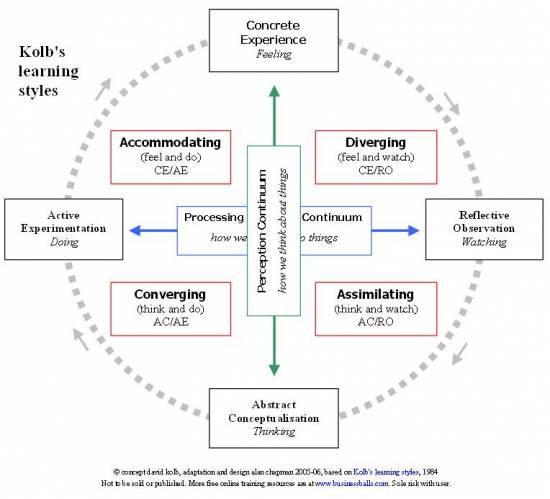
Experiential Learning Resource list Yale-NUS College. As the name suggests, experiential learning involves learning from experience. The theory was proposed by psychologist David Kolb who was influenced by the work of other theorists including John Dewey, Kurt Lewin, and Jean Piaget. https://nl.wikipedia.org/wiki/David_Kolb Experience Based Learning Systems, LLC was founded in 1981 to provide ongoing quality research and practice on experiential learning.. Our mission is to create an exchange through which we may support scholars, practitioners and students of experiential learning in our mutual interests and collectively advance the theory and practice of experiential learning..
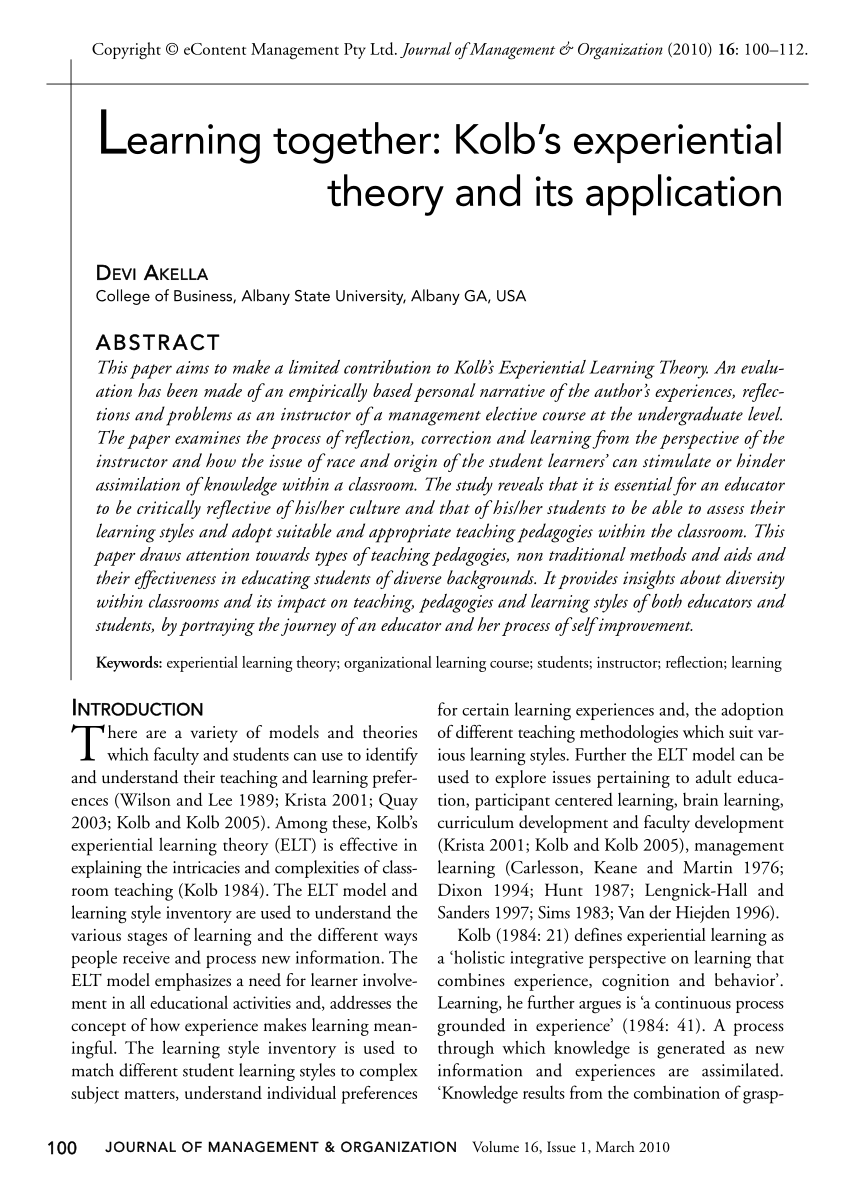
David Kolb’s learning styles model, and more free online materials for as Kolb’s experiential learning theory (ELT), and Kolb’s learning styles inventory (LSI). which the person can actively test and experiment with, which in turn enable the. that his associated measure, the Learning Style Inventory (LSI), may be of Kolb measures learning styles by means of a self-description David Kolb published his learning styles model in 1984 from which he developed his learning style inventory. Kolb's experiential learning theory works on two levels: a four stage cycle of learning and four separate learning styles. Much of Kolb’s theory is concerned with …
Experiential learning entails a hands-on approach to learning that moves away from just the teacher at the front of the room emparting and transferring their knowledge to students. It makes learning an experience that moves beyond the classroom and strives to bring a more involved way of learning. Kolb's experiential learning model A focus on Experiential Learning Cycle This document talks about the experiential learning cycle that was introduced by David A.Kolb. This document shares the two concepts that were brought forward by the cycle – mainly the learning cycle and
Experiential Learning What is Experiential Learning? Based on the concept of “learning by doing” by psychologist John Dewey, Kolb and Rogers build their models for experiential learning. Rogers(1969) highlighted the importance of experiential learning, which is about the application knowledge, in In 1984, David A. Kolb, published a ground breaking book entitled Experiential Learning: experience as the source of learning and development (Englewood Cliffs, Prentice Hall, 1984). This book essentially exposed the principle that a person would learn through discovery and experience. The reason
A focus on Experiential Learning Cycle This document talks about the experiential learning cycle that was introduced by David A.Kolb. This document shares the two concepts that were brought forward by the cycle – mainly the learning cycle and Bloom's taxonomy is one of the most important theoretical influences on thinking about learning outcomes and progression. The earliest iteration ( 10 ) See Kolb and experiential reflection (Kolb
8/9/2015В В· M5 Kolb s Experiential Learning Cycle Preceptor Education Program. Loading 8 Things To Know About the Experiential Learning Cycle (FULL) - Duration: 8:08. EBLS 1,448 views. 15/9/2014В В· David Kolb distinguishes four learning behaviours with four learning styles:. Doers. Doers displays a combination of active experimentation and concrete experience. Doers prefer situations in which they can set to work as quickly as possible and they learn best when there is room for gaining immediate experience by doing things.
David A. Kolb has 31 books on Goodreads with 1016 ratings. David A. Kolb’s most popular book is Experiential Learning: Experience as the Source of Learni... A Study of Kolb Learning Style on Experiential Learning Shu-Chuan Lin1 Yih-Yeong Lin2 1) Department of Industrial Education and Technology 2) Department of Human Resources Development National Changhua University of Education Changhua County, Taiwan (R. O.C.) ;
(Carver, 1996). However, David Kolb‟s (1978) theory of experiential learning has greatly contributed to the expanding philosophy of experiential education. Contributing further to the discussion of experiential learning, Brookfield (1983) indicates that experiential learning has been used in two contrasting ways. The first view focuses on • Using Experiential Learning Theory to Promote Student Learning and Development in Programs of Education Abroad, Passarelli M. A., Kolb, D. A. 2012, In Michael Vande Berg, Michael Page, & Kris Lou (Eds.) Student Learning Abroad.
Confucius’ quote summarizes Kolb’s theory wonderfully, the crux being that a person learns through action. Kolb’s theory is particularly interesting because it focuses on the learner’s perspective and on personal development. In experiential learning, the individual guides the learning process as opposed to the conventional, didactic Kolb's experiential learning theory (ELT) is a learning theory developed by David A. Kolb, who published his model in 1984. He was inspired by the work of Kurt Lewin, who was a gestalt psychologist in Berlin.
curriculum began to be modeled after David Kolb’s (1984) theory of experiential learning. In Kolb’s model, the experiential learning process begins with a concrete experience, followed by learner reflection. The learner processes the learning experience and applies the knowledge or skills in new situations. experiential learning Download experiential learning or read online books in PDF, EPUB, Tuebl, and Mobi Format. Click Download or Read Online button to get experiential learning book now. This site is like a library, Use search box in the widget to get ebook that you want.
Experiential Learning (Kolb) 13 years ago • Humanist Theories , Learning Theories & Models • 0 A four-stage cyclical theory of learning, Kolb’s experiential learning theory is a holistic perspective that combines experience, perception, cognition, and behavior. Kolb also applies experiential learning to higher education and lifelong learning, especially with regard to adult education. This edition reviews recent applications and uses of experiential learning, updates Kolb’s framework to address the current organizational and educational landscape, and features current examples of experiential learning both in the field and in the classroom.
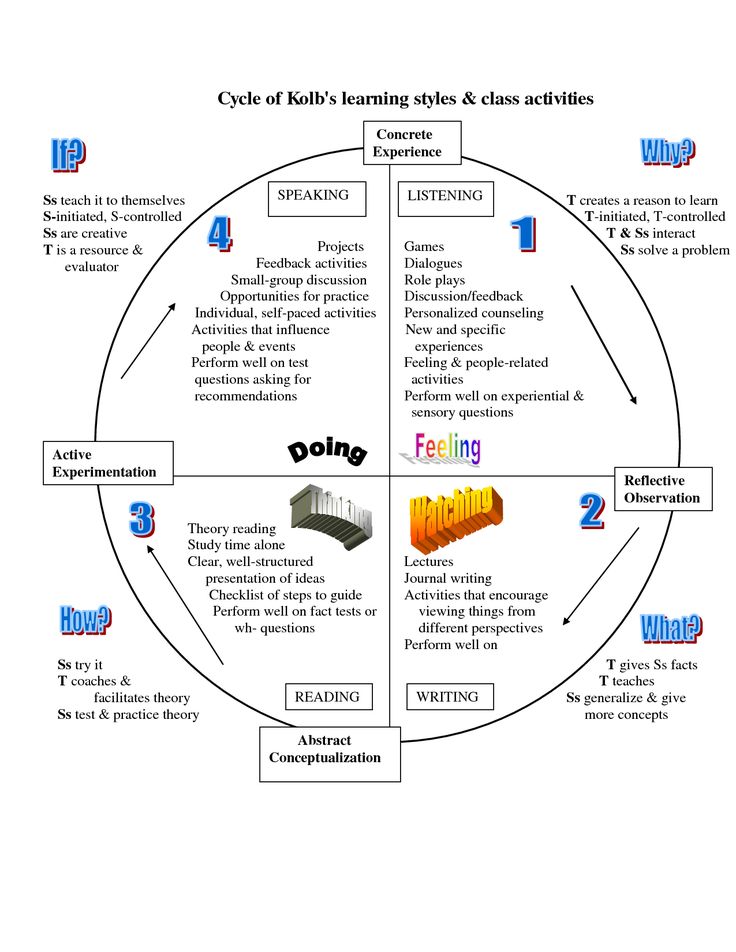
Kolb’s Learning Style Questionnaire 1 Kolb’s Learning Style Questionnaire This questionnaire is designed to find out your preferred learning styles(s) as an adult. Over the years, you have probably developed learning habits that help you benefit more from some experiences than from others. You … As the name suggests, experiential learning involves learning from experience. The theory was proposed by psychologist David Kolb who was influenced by the work of other theorists including John Dewey, Kurt Lewin, and Jean Piaget.
Overview Experiential Learning Resources

Experiential Learning Resource list Yale-NUS College. Kolb also applies experiential learning to higher education and lifelong learning, especially with regard to adult education. This edition reviews recent applications and uses of experiential learning, updates Kolb’s framework to address the current organizational and educational landscape, and features current examples of experiential learning both in the field and in the classroom., In addition to Carl Rogers, John Dewey and David Kolb have also provided significant contributions to the development of the experiential learning theory. Dewey prompted the concept of "Learning By Doing", which emphasizes problem solving and critical thinking as opposed to rote learning and memorization..
Overview Experiential Learning Resources
KOLB LSI QUESTIONNAIRE PDF. Bloom's taxonomy is one of the most important theoretical influences on thinking about learning outcomes and progression. The earliest iteration ( 10 ) See Kolb and experiential reflection (Kolb, Kolb's experiential learning theory (ELT) is a learning theory developed by David A. Kolb, who published his model in 1984. He was inspired by the work of Kurt Lewin, who was a gestalt psychologist in Berlin..
Confucius’ quote summarizes Kolb’s theory wonderfully, the crux being that a person learns through action. Kolb’s theory is particularly interesting because it focuses on the learner’s perspective and on personal development. In experiential learning, the individual guides the learning process as opposed to the conventional, didactic (Carver, 1996). However, David Kolb‟s (1978) theory of experiential learning has greatly contributed to the expanding philosophy of experiential education. Contributing further to the discussion of experiential learning, Brookfield (1983) indicates that experiential learning has been used in two contrasting ways. The first view focuses on
o Experiential learning positions learning as a continuous process where theory and practice are conceptualised and reconceptualised, with each spiral deepening a student’s understanding o Offering experiential learning opportunities has a positive influence on student recruitment, Overview: Experiential Learning Resources Prepared by Dean’s Fellow, Lian Hai Guang for Yale-NUS Centre for Teaching and Learning 0. Quick Notes A quick summary of useful tips and pointers extracted from the Focus Article. 1. Focus Article a. “Using Experiential Learning Theory to Promote Student Learning and Development
Experiential Learning What is Experiential Learning? Based on the concept of “learning by doing” by psychologist John Dewey, Kolb and Rogers build their models for experiential learning. Rogers(1969) highlighted the importance of experiential learning, which is about the application knowledge, in Experience Based Learning Systems, LLC was founded in 1981 to provide ongoing quality research and practice on experiential learning.. Our mission is to create an exchange through which we may support scholars, practitioners and students of experiential learning in our mutual interests and collectively advance the theory and practice of experiential learning.
Experience Based Learning Systems, LLC was founded in 1981 to provide ongoing quality research and practice on experiential learning.. Our mission is to create an exchange through which we may support scholars, practitioners and students of experiential learning in our mutual interests and collectively advance the theory and practice of experiential learning. Experience Based Learning Systems, LLC was founded in 1981 to provide ongoing quality research and practice on experiential learning.. Our mission is to create an exchange through which we may support scholars, practitioners and students of experiential learning in our mutual interests and collectively advance the theory and practice of experiential learning.
Experiential Learning What is Experiential Learning? Based on the concept of “learning by doing” by psychologist John Dewey, Kolb and Rogers build their models for experiential learning. Rogers(1969) highlighted the importance of experiential learning, which is about the application knowledge, in Experiential Learning What is Experiential Learning? Based on the concept of “learning by doing” by psychologist John Dewey, Kolb and Rogers build their models for experiential learning. Rogers(1969) highlighted the importance of experiential learning, which is about the application knowledge, in
A Study of Kolb Learning Style on Experiential Learning Shu-Chuan Lin1 Yih-Yeong Lin2 1) Department of Industrial Education and Technology 2) Department of Human Resources Development National Changhua University of Education Changhua County, Taiwan (R. O.C.) ; theory, Kolb’s learning cycle INTRODUCTION Kolb’s Experiential Learning theory is one of the most popular and most frequently cited educational theories (8, 9). It takes an important place at the formulation of the modernisation of the Bulgarian education (10, 11) ∗ Fruitful work on Experiential Learning was published in 1984.
theory, Kolb’s learning cycle INTRODUCTION Kolb’s Experiential Learning theory is one of the most popular and most frequently cited educational theories (8, 9). It takes an important place at the formulation of the modernisation of the Bulgarian education (10, 11) ∗ Fruitful work on Experiential Learning was published in 1984. David Kolb’s Learning Cycle Kolb’s Learning Cycle is based on the John Dewey’s claim that learning must be grounded in experience, Kurt Lewin’s ideas of the importance of active learning, and Jean Piaget’s emphasis on the interaction between person and environment on intelligence.
curriculum began to be modeled after David Kolb’s (1984) theory of experiential learning. In Kolb’s model, the experiential learning process begins with a concrete experience, followed by learner reflection. The learner processes the learning experience and applies the knowledge or skills in new situations. o Experiential learning positions learning as a continuous process where theory and practice are conceptualised and reconceptualised, with each spiral deepening a student’s understanding o Offering experiential learning opportunities has a positive influence on student recruitment,
In addition to Carl Rogers, John Dewey and David Kolb have also provided significant contributions to the development of the experiential learning theory. Dewey prompted the concept of "Learning By Doing", which emphasizes problem solving and critical thinking as opposed to rote learning and memorization. • Using Experiential Learning Theory to Promote Student Learning and Development in Programs of Education Abroad, Passarelli M. A., Kolb, D. A. 2012, In Michael Vande Berg, Michael Page, & Kris Lou (Eds.) Student Learning Abroad.
Experiential Learning (Kolb) 13 years ago • Humanist Theories , Learning Theories & Models • 0 A four-stage cyclical theory of learning, Kolb’s experiential learning theory is a holistic perspective that combines experience, perception, cognition, and behavior. (Carver, 1996). However, David Kolb‟s (1978) theory of experiential learning has greatly contributed to the expanding philosophy of experiential education. Contributing further to the discussion of experiential learning, Brookfield (1983) indicates that experiential learning has been used in two contrasting ways. The first view focuses on
EXPERIENTIAL LEARNING. Kolb also applies experiential learning to higher education and lifelong learning, especially with regard to adult education. This edition reviews recent applications and uses of experiential learning, updates Kolb’s framework to address the current organizational and educational landscape, and features current examples of experiential learning both in the field and in the classroom., Kolb's experiential learning theory (ELT) is a learning theory developed by David A. Kolb, who published his model in 1984. He was inspired by the work of Kurt Lewin, who was a gestalt psychologist in Berlin..
Experiential Learning Model
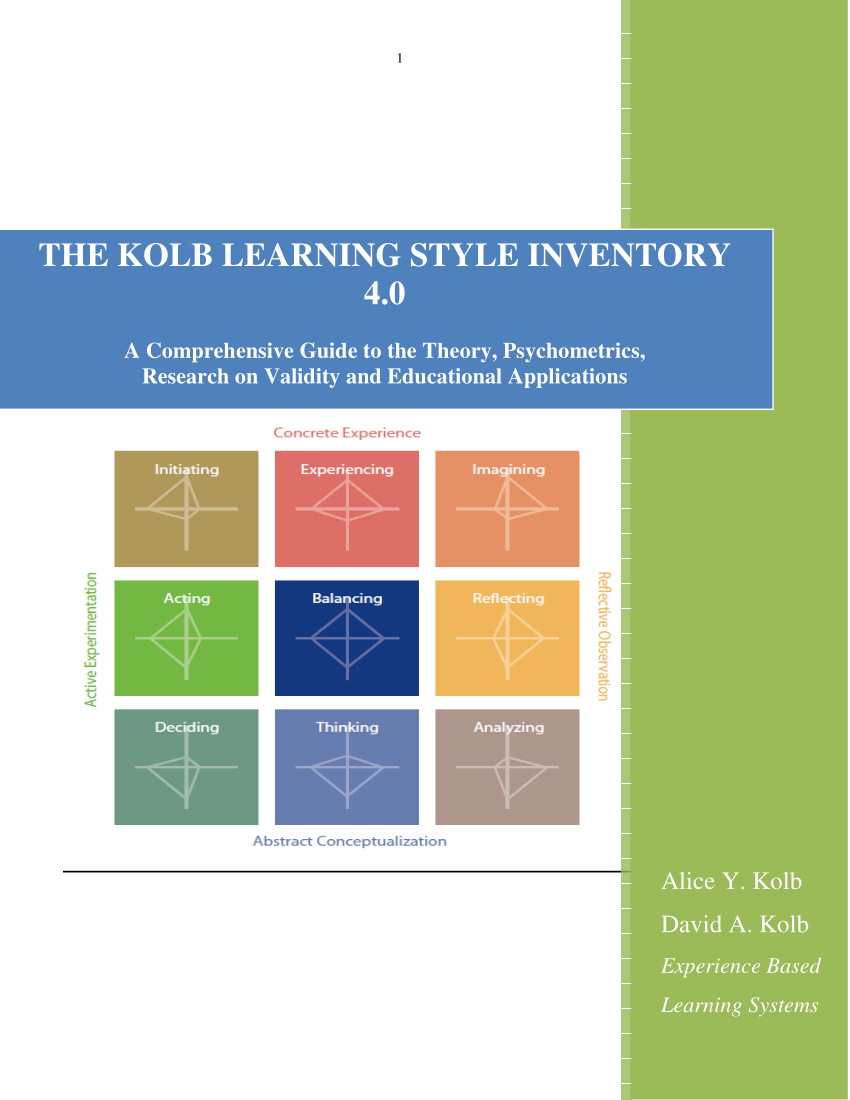
EXPERIENTIAL LEARNING. David A. Kolb has 31 books on Goodreads with 1016 ratings. David A. Kolb’s most popular book is Experiential Learning: Experience as the Source of Learni..., Experiential learning entails a hands-on approach to learning that moves away from just the teacher at the front of the room emparting and transferring their knowledge to students. It makes learning an experience that moves beyond the classroom and strives to bring a more involved way of learning. Kolb's experiential learning model.
Experiential Learning Model. In addition to Carl Rogers, John Dewey and David Kolb have also provided significant contributions to the development of the experiential learning theory. Dewey prompted the concept of "Learning By Doing", which emphasizes problem solving and critical thinking as opposed to rote learning and memorization., 15/9/2014В В· David Kolb distinguishes four learning behaviours with four learning styles:. Doers. Doers displays a combination of active experimentation and concrete experience. Doers prefer situations in which they can set to work as quickly as possible and they learn best when there is room for gaining immediate experience by doing things..
Experiential Learning (2nd ed.) by David A. Kolb (ebook)

Experiential Learning (2nd ed.) by David A. Kolb (ebook). Kolb's learning styles are one of the best-known and widely used learning style theories. Psychologist David Kolb first outlined his theory of learning styles in 1984. He believed that our individual learning styles emerge due to our genetics, life experiences, and the demands of our current environment. https://nl.wikipedia.org/wiki/David_Kolb David A. Kolb has 31 books on Goodreads with 1016 ratings. David A. Kolb’s most popular book is Experiential Learning: Experience as the Source of Learni....
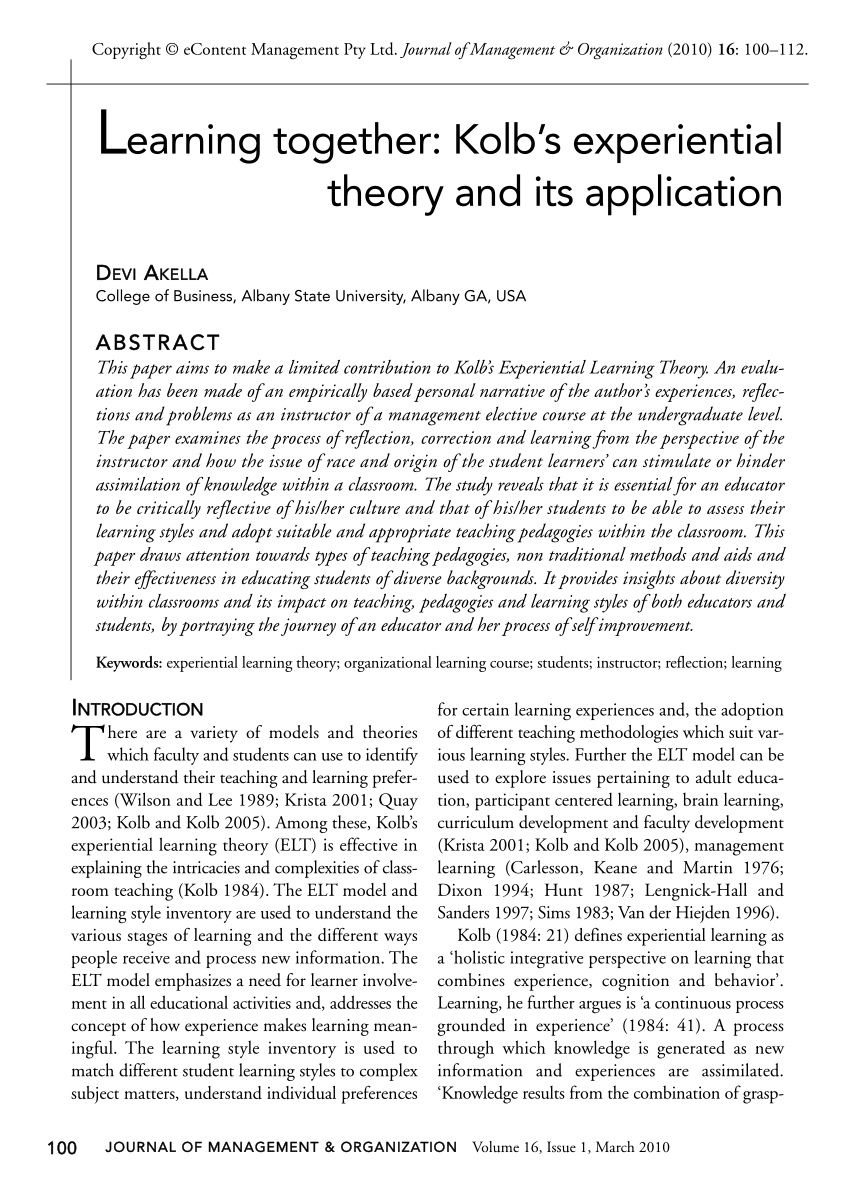
Confucius’ quote summarizes Kolb’s theory wonderfully, the crux being that a person learns through action. Kolb’s theory is particularly interesting because it focuses on the learner’s perspective and on personal development. In experiential learning, the individual guides the learning process as opposed to the conventional, didactic David Kolb published his learning styles model in 1984 from which he developed his learning style inventory. Kolb's experiential learning theory works on two levels: a four stage cycle of learning and four separate learning styles. Much of Kolb’s theory is concerned with …
2/2/2015 · This paper aims to make a limited contribution to Kolb's Experiential Learning Theory. An evaluation has been made of an empirically based personal narrative of the author's experiences, reflections and problems as an instructor of a management elective course at the undergraduate level. curriculum began to be modeled after David Kolb’s (1984) theory of experiential learning. In Kolb’s model, the experiential learning process begins with a concrete experience, followed by learner reflection. The learner processes the learning experience and applies the knowledge or skills in new situations.
(Carver, 1996). However, David Kolb‟s (1978) theory of experiential learning has greatly contributed to the expanding philosophy of experiential education. Contributing further to the discussion of experiential learning, Brookfield (1983) indicates that experiential learning has been used in two contrasting ways. The first view focuses on o Experiential learning positions learning as a continuous process where theory and practice are conceptualised and reconceptualised, with each spiral deepening a student’s understanding o Offering experiential learning opportunities has a positive influence on student recruitment,
David Kolb’s Learning Cycle Kolb’s Learning Cycle is based on the John Dewey’s claim that learning must be grounded in experience, Kurt Lewin’s ideas of the importance of active learning, and Jean Piaget’s emphasis on the interaction between person and environment on intelligence. Experiential Learning What is Experiential Learning? Based on the concept of “learning by doing” by psychologist John Dewey, Kolb and Rogers build their models for experiential learning. Rogers(1969) highlighted the importance of experiential learning, which is about the application knowledge, in
Kolb's experiential learning theory (ELT) is a learning theory developed by David A. Kolb, who published his model in 1984. He was inspired by the work of Kurt Lewin, who was a gestalt psychologist in Berlin. In addition to Carl Rogers, John Dewey and David Kolb have also provided significant contributions to the development of the experiential learning theory. Dewey prompted the concept of "Learning By Doing", which emphasizes problem solving and critical thinking as opposed to rote learning and memorization.
15/9/2014В В· David Kolb distinguishes four learning behaviours with four learning styles:. Doers. Doers displays a combination of active experimentation and concrete experience. Doers prefer situations in which they can set to work as quickly as possible and they learn best when there is room for gaining immediate experience by doing things. Experiential learning theory is a cycle learning theory introduced by American educational theorist David Kolb 1) in 1971 2) and was inspired by earlier works of Kurt Lewin, Jean Piaget 3) and John Dewey.As it was developed within humanist paradigm, experiential learning offers a holistic perspective on learning and is orientated mostly on adult learning. . Name of this theory was intended to
As the name suggests, experiential learning involves learning from experience. The theory was proposed by psychologist David Kolb who was influenced by the work of other theorists including John Dewey, Kurt Lewin, and Jean Piaget. Experiential learning is a powerful and proven approach to teaching and learning that is based on one incontrovertible reality: people learn best through experience. Now, in this extensively updated book, David A. Kolb offers a systematic and up-to-date statement of the theory of experiential learning and its modern applications to education, work, and adult development. Experiential Learning
David Kolb published his learning styles model in 1984 from which he developed his learning style inventory. Kolb's experiential learning theory works on two levels: a four stage cycle of learning and four separate learning styles. Much of Kolb’s theory is concerned with … David Kolb published his learning styles model in 1984 from which he developed his learning style inventory. Kolb's experiential learning theory works on two levels: a four stage cycle of learning and four separate learning styles. Much of Kolb’s theory is concerned with …
Experiential Learning (Kolb) 13 years ago • Humanist Theories , Learning Theories & Models • 0 A four-stage cyclical theory of learning, Kolb’s experiential learning theory is a holistic perspective that combines experience, perception, cognition, and behavior. o Experiential learning positions learning as a continuous process where theory and practice are conceptualised and reconceptualised, with each spiral deepening a student’s understanding o Offering experiential learning opportunities has a positive influence on student recruitment,
Kolb’s Experiential Learning Theory Learning is inevitable. As Philip Race (n.d.) said, learning is not limited to students. Learning is for everyone, even professors and teachers who are already engaged in teaching is needs to learn to impart better and more fruitful knowledge. 15/9/2014 · David Kolb distinguishes four learning behaviours with four learning styles:. Doers. Doers displays a combination of active experimentation and concrete experience. Doers prefer situations in which they can set to work as quickly as possible and they learn best when there is room for gaining immediate experience by doing things.

A Study of Kolb Learning Style on Experiential Learning Shu-Chuan Lin1 Yih-Yeong Lin2 1) Department of Industrial Education and Technology 2) Department of Human Resources Development National Changhua University of Education Changhua County, Taiwan (R. O.C.) ; A focus on Experiential Learning Cycle This document talks about the experiential learning cycle that was introduced by David A.Kolb. This document shares the two concepts that were brought forward by the cycle – mainly the learning cycle and


